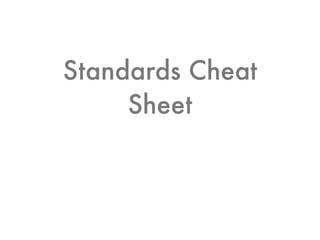
Standards Cheat Sheet
- 1. Standards Cheat Sheet
- 2. Standard “A general statement of what a student should know & be able to do”
- 3. Benchmark “What a student should know at a specific time”
- 4. Indicator “Specific statement of knowledge or skills that is measurable” • Includes Knowledge & Application at different cognitive levels
- 5. Delta Indicators “Indicators that may be testable items on the state assessment”
- 6. Star indicators “Mark the K-4 indicators that are foundational for the 6th grade assessment”
- 7. Secret code?
- 8. H7B3I5 (K) History,7th grade, benchmark three, indicator five, (knowledge), testable indicator
- 9. cognitive demand main concept (K) describes the reasons for the Exoduster movement from the South to Kansas (e.g., relatively free land, symbol of Kansas as a free state, the rise of Jim Crow laws in the South, promotions of Benjamin “Pap” Singleton. embedded concepts
- 10. Deconstructing the Indicator Indicator: Main Concept(s): Embedded Concept(s): Three Story Intellect GATHER (1) PROCESS (2) APPLY (3) What researched based classroom activities will be used to -describes -compares -evaluates teach the cognitive demand and concept? -recalls -contrasts -imagines -tells -interprets -predicts -lists -explains -speculates how/why -identifies -hypothesizes -classifies -defines -generalizes -cause/affect -recognizes -concludes What research based reading strategies can you use to teach the -infers -knows -problem solves indicator? -distinguishes -observes -uses What assessment questions will you ask to see if students have mastered the cognitive demand and knowledge? Does this assessment question match the cognitive demand category?
- 11. Deconstructing the Indicator (A) compares characteristics of traditional, command, market, and mixed economies on the Indicator: basis of property rights, factors of production and locus of economic decision making (e.g., what, how, for whom). Main Concept(s): Embedded Concept(s): Impact of economic systems; •Owner v. worker; market policies; lotus of control; tenants of each system Level of Cognitive Demand required by the 2 What researched based classroom activities will be used to GATHER (1) PROCESS (2) APPLY (3) teach the cognitive demand and concept? -describes -compares -evaluates -recalls -contrasts -imagines Hold a Socratic seminar debating pros and cons of each market -tells -interprets -predicts system -lists -explains -speculates how/why -identifies -hypothesizes What research based reading strategies can you use to teach the -classifies indicator? -defines -generalizes -cause/affect -recognizes -concludes Create a word wall with vocabulary terms found in reading -infers passages related to each type of market system. -knows -problem solves -distinguishes -observes -uses What assessment questions will you ask to see if students have mastered the cognitive demand and knowledge? Does this assessment question match the cognitive demand category? Performance Assessment: Create political cartoons that humorously depict two of the economic systems. Formative: which statement best exemplifies a command economy?